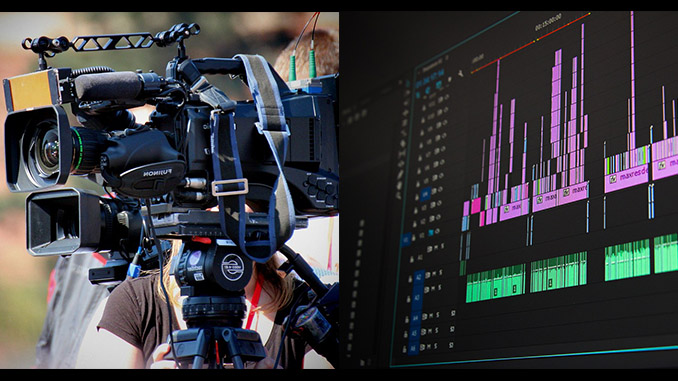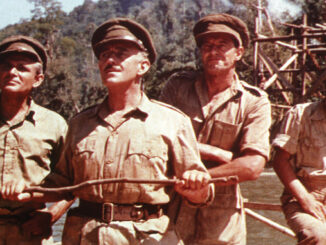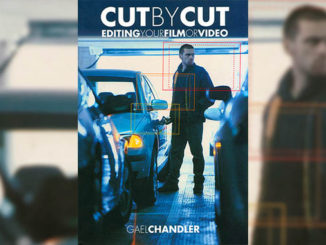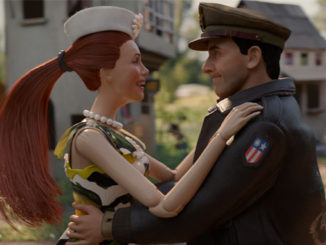
Though camera and editorial often seem to work in separate worlds, the two departments have many concerns in common. Editor Steve Mirkovich (Con Air, I Know What You Did Last Summer, Broken Arrow and The Ghost and the Darkness) and cinematographer Allen Daviau (E.T. the Extra-Terrestrial, The Color Purple, Empire of the Sun, Fearless, Bugsy and Defending Your Life) met when they worked together on The Astronaut’s Wife. They found that they shared many ideas about the craft and business of filmmaking, and they explored some of them in this conversation, which began in our last issue. Here, the two discuss the importance of defending their crews, why they choose one project over another, and how they deal with the stress of tight schedules.
Steve Mirkovich: Where do you think the industry is going?
Allen Daviau: I’m concerned that, in a lot of cases, movies are dumbed down to a ridiculous degree.
Mirkovich: They’re going for certain age groups, based on money. I think there’s room for all kinds of movies. I also believe there are some really good films being made out there, but they’re getting harder and harder to find. I do find that studios are spending more money for editors and DPs, especially on lower-budget pictures. They used to be cheap, cheap, cheap, all the way down the line. Now, in key areas, they’re surrounding new directors with experienced people, and you’re finding on a $10 million picture that editors are making as much as they would on a $50 or $60 million movie.
Daviau: But you’ve got to get your crew paid, too.
Mirkovich: You wonder at dailies why they’re not paying somebody like the focus puller more. I saw a movie last week that was riddled with soft close-ups. If you make a mistake in editing, you can go back and you fix it. If you blow focus, there’s no going back.
Daviau: That’s why I call my focus puller to make sure he’s tucked into bed well. There aren’t many of them that are really good, because they have to understand all the technology, yet still have poetry in their soul. It’s also the most thankless task — nobody notices them until they screw up.
Mirkovich: How do you decide what projects you’re going to become involved with?
“I will sometimes turn down a picture if I can’t take my assistant. It depends on the circumstances. It would be like going on location without one of my arms. I’d be setting myself up not to do as good a job.” – Steve Mirkovich
Daviau: I ask myself, what does this script do? Is it something that is a challenge to me? Is it something I’ve never done before, or something I’ve done before but can do better this time? Mostly, though, I ask, what is it about? What does it say?
Mirkovich: I’ve done a couple of genre pictures over the last five or six years, and they’re fun, because there’s not the same kind of pressure as when you do something really serious. Nobody thinks you’re making Gone with the Wind, and it’s satisfying to get that “boo” scare out of an audience. But the last thing you want is to be pigeonholed.
Daviau: It’s the most difficult thing to avoid.
Mirkovich: You have to learn to turn things down, and to be careful. But it’s hard. I find something redeeming in most scripts, in most crews, and in most producers and directors.
Daviau: It’s also hard to resist if somebody’s making a picture about something that you already care about. All Barry Levinson had to do was say, “Bugsy Siegel shows up in Hollywood in the 1940s. It was the same thing on Empire of the Sun. My parents had been in Shanghai in 1939. And suddenly I’m reading a script that takes place in Shanghai in 1941. As the cinematographer John Hora said, “The best means of time travel that you’ll ever have is shooting a period film.”
Mirkovich: One thing that’s changing for me is that I have to be on location a lot longer lately. I used to go on location for three or four months, then come back to Los Angeles and finish. But I spent eight months in New York on The Astronaut’s Wife. Valentine was a seven- or eight-month Canadian stay. And Detox was a five-month Canadian stay. Out of the last six years, I’ve been on location half the time. That’s why you can’t help but second guess yourself and wonder if you’ve accepted the right projects. Every time you do a picture, it’s a year of your life. After every picture, I try to decompress for two months.
“I call my focus puller to make sure he’s tucked into bed well. There aren’t many of them that are really good, because they have to understand all the technology, yet still have poetry in their soul. It’s also the most thankless task — nobody notices them until they screw up.” – Allen Daviau
Daviau: And you have to say you’re going to take the time off, and then do it.
Mirkovich: How much do you get involved in protecting your crew? How much do you go to bat for them?
Daviau: I have a certain reputation: “Oh, you’re always out there being the agent for your crew.” Yes, I am, because they’re loyal as hell to me, so I better be loyal back to them. I want them there and paid well, and I want them to be happy.
Mirkovich: I totally agree. I usually hire my first assistant, Tim Alverson, who has been my co-editor on four or five movies, then I’ll let him hire the rest of the crew. I’ll take an active part in their money deals to get them the best rate I can. I don’t just turn them over to the production manager, because they’re usually younger people, and they will get chewed up. And you know what? They do deserve a raise after their last picture. I also stress that they should do things that are part of their personal life — doctor appointments, dentist appointments, go see their kid in a play.
Daviau: Production crews rarely know about things like that.
Mirkovich: If your crew is happy in their personal lives, they’re generally happier at work. I’d like to think that I have a line of people waiting to join my crews, because they’ve heard I’m one of the nice guys to work with. It’s really important to me that my crew understands that I will allow them to be adults and take care of their personal lives, knowing that they will do the job that’s necessary as well. It’s about respect and harmony.
Daviau: I think a lot of people don’t realize that your crew is like your family for a large percentage of your life, so you’ve got to treat them as well as you can and see that they are well rewarded.
“You have to fight for things, even though some people might think you’re being difficult. At the end of the day, you have to be able to say that you’ve given it your best shot. Whether they know it or not, that’s what they want.” – Steve Mirkovich
Mirkovich: I will sometimes turn down a picture if I can’t take my assistant. It depends on the circumstances. It would be like going on location without one of my arms. I’d be setting myself up not to do as good a job. Organization is important — the way your crew handles your day so that you can edit. When producers say, “No, you can’t take anybody,” that means they don’t realize the value of a key and how he or she helps the lead.
Daviau: I’ve been in situations where I had to go alone to other lands and it really makes you appreciate your regular crew. The foreign crew may be excellent, but your regular crew can anticipate which direction you’re going, and it will save the production time and money. I would generally like to take an operator, first assistant, gaffer and key grip. But once, I took everybody –on The Color Purple. We shot in North Carolina, and the production manager said, “We’re going to take the crew from Los Angeles, because we’re going to have a lot to do. I want everybody to start on the same page.” But part of the business is that you have to be prepared to show up in strange territory and meet people and work with them.
Mirkovich: I think production is governed and more closely watched than editing, because there are so many unions in one place at the same time. When you work overtime, you get paid. In editing, it’s easy for producers to say, “It’ll balance out.” But I always make sure that my crews get paid for their overtime.
Daviau: I find some directors don’t want to work overtime. You get beyond twelve hours, and everybody’s productivity drops. Vittorio Storaro says, “I can always tell a shot that I did after ten hours.” You want to plan the film so that it can be produced efficiently, in as short a day as possible. Otherwise, you just build exhaustion into the process. On Pleasantville, a camera assistant named Brent Hershman got killed. He worked a nineteen-hour day, then driving home he fell asleep on the freeway. But as a cinematographer, if I’m in the same city as the lab, I’ll go see dailies or in the case of commercials, do the video transfer of the dailies, at least two hours before my call time.
Mirkovich: Which is a freebie, too.
“I have a certain reputation: “Oh, you’re always out there being the agent for your crew.” Yes, I am, because they’re loyal as hell to me, so I better be loyal back to them. I want them there and paid well, and I want them to be happy.” – Allen Daviau
Daviau: At the other end of the day, I go to dailies with the director and the producers and everybody else. Those evening screenings are important, because it’s where we have some discussions about coverage. Some directors just can’t sleep at night unless they’ve covered every angle, like George Stevens. On the other hand, I’ve seen Steven Spielberg walk away without a really perfect take on a master. He knows where he’s going to cut and won’t get coverage that he doesn’t need. At the same time, I’ve seen him cover dinner table scenes thoroughly, to put it mildly.
Mirkovich: One thing that I wish I knew more about was lenses. On every picture, when I look at dailies, I always look at what lenses were used.
Daviau: I remember working at Studio City Camera Exchange, and Sydney Pollack came in and started buying Pentax lenses. He wound up buying nearly the whole catalog of lenses because he was just starting to direct in television, and he really wanted to understand lenses. Years later, when we met up again, I said, “I always thought it was great that you owned all the lenses.” He said, “Yes, that way I could figure out all the choices I had.” I wish that assistant editors knew more about the lab and what really happens there. I’ve always wanted to take a group of assistant editors through the lab and show them the real procedure from beginning to end.
Mirkovich: It would be helpful for assistant editors to spend some days with the camera assistants, so they knew what happens on set — how difficult it sometimes is to get a slate and make sure that the right things are circled. I also think it would be good for camera assistants to spend a couple days in the editing room.
Daviau: A little bit of knowledge of the other side would be helpful.
Mirkovich: How do you approach your dailies?
Daviau: I want the dailies to accurately convey the photographic concept. We may make changes later, but the more you have the director seeing what you’re after, the more centered-up you are.
“I find something redeeming in most scripts, in most crews, and in most producers and directors.” – Steve Mirkovich
Mirkovich: You have to fight for things, even though some people might think you’re being difficult. At the end of the day, you have to be able to say that you’ve given it your best shot. Whether they know it or not, that’s what they want.
Daviau: There’s a joke about me: “Someday you’re going to release a DVD of your best grayscales.” But they are your silent communicators with the lab. That way, when you do your answer print, you can make changes that are based on telling the story. After I see what the editor emphasizes in a scene, I may want to do something a little different with the color and the density work than I thought when I originally shot it. Most of the time, I wind up in the lab while you guys are slaving on the sound. That’s with the exception of E.T. — Carol Littleton was with me at the lab during much of the time I worked on the answer print for that.
Mirkovich: I love being involved in the answer print, the color correction and all that. But let’s face it, if I’m available and you’re available, I am going to sit and listen to you — somebody whose job it is to put the image on the screen. Your ideas and opinions on color and mood are going to be more valuable in the long run.
“I’ve been in situations where I had to go alone to other lands and it really makes you appreciate your regular crew.” – Allen Daviau
Daviau: At the same time, I would be really happy to sit in the dub and hear the music for a certain scene, then go back to the lab and change the color, because suddenly I think, “Whoa, you did that with the music, did you? Okay, I should make that scene a little darker and a little bluer.”
Mirkovich: I always view cinematography as telling a story through visuals, while an editor’s training is more in terms of performance and rhythm. Editors have to take everything into consideration, not just the cinematography. It all comes together in a big ball, and we have the responsibility as editors to step back and look at that combination and say, “This works collectively and not just on its own.” That’s what I love about editing.
Daviau: Telling that story.
Mirkovich: It’s a luxury and a privilege to work in this business — there are so many opportunities. We could all be repairing tractors or saying, “No, ma’am, that’s on aisle five.”
Daviau: It’s my running joke: “I could be back at the camera store tomorrow morning.” I learned a lot in the camera store, by the way. But I’m sure glad that I am able to work in motion pictures.
Mirkovich: Good food, good money, great experiences. To be able to go to work, look and dress the way you want — long hair, short hair, no hair. And they just say, “He’s eccentric. He’s artistic.” What a wonderful business.





